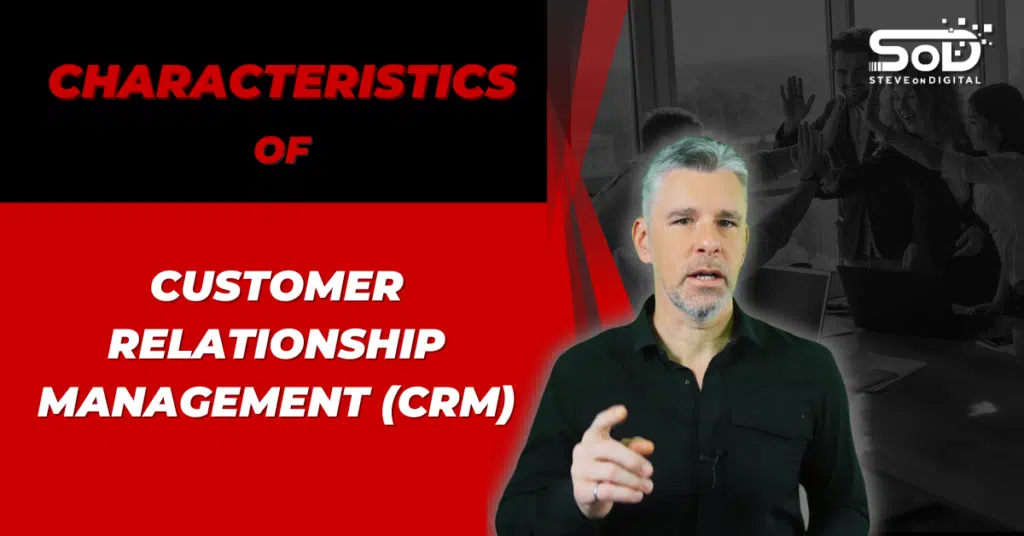Characteristics Of Customer Relationship Management (CRM)

Customer Relationship Management (CRM) is about understanding and managing customer interactions to build better business relationships. Collecting customer data, analyzing interactions and personalizing customer experiences. To increase customer satisfaction and loyalty, streamline sales and marketing processes and be more efficient. By using technology, CRM gives you insight into customer behavior so you can tailor your approach to your customer needs. What is Customer Relationship Management (CRM) As the founder of SteveOnDigital, I have been in the digital world for many years and have seen the value of Customer Relationship Management (CRM) for myself. At its heart CRM is about building and maintaining relationships with your customers. It’s evolved from simple customer tracking systems to complex platforms that can manage and analyze customer interactions across multiple touchpoints. The goal? To build better business relationships, retain customers and drive sales growth. Customer Satisfaction with CRM At the heart of customer relationship management (CRM) is customer satisfaction, the ultimate goal to build positive customer relationships and loyalty. A good CRM is based on understanding and anticipating individual customer needs and preferences. By using CRM tools you can offer personalized interactions, responsive service and forward thinking solutions, all of which drive satisfaction. This focus on customer satisfaction will get repeat business and will build a positive reputation, the foundation for a strong and respected brand. History of CRM The history of CRM is a reflection of the pace of technology and the rise of customer centric business. In the beginning businesses used manual notebooks and spreadsheets to track customer interactions, which was time consuming and error prone. The introduction of digital CRM systems changed all that, a centralized platform to store customer data, track interactions and automate sales processes. Today CRM has added AI, cloud and mobile to the mix making CRM more accessible, more powerful and more necessary than ever. Key Characteristics Of CRM CRM systems are the foundation of a good customer relationship management strategy. Let’s break them down: Integration One of the biggest benefits of modern CRM systems is they can integrate with other business tools and platforms. This means all customer interactions, whether by email, social media or the company website can be captured and stored in one place. For SteveOnDigital this means we have a single view of the customer journey and can make informed decisions and personalize experiences. Lead Management Lead management is another important part of CRM. It’s about tracking potential customers (leads) from the first point of contact through the sales funnel to the sale. Good lead management means you know where each lead is in the sales process, what actions to take to move them forward and how likely they are to convert to a paying customer. This is key to optimizing sales and conversion rates. Customer Data Insights via CRM Customer data is at the heart of the CRM framework, providing valuable insights into customer behavior, preferences and trends. The collection, analysis and deployment of this data is key to making business decisions, refining marketing and developing products that resonate with the target market. CRM software makes this process easier through data segmentation, so you can send targeted communications and bespoke customer experiences that build the relationship between business and customer. Workflow Automation Workflow automation is about automating and streamlining repetitive tasks within the CRM. This could be sending follow up emails, updating sales records or assigning tasks to team members. Automation saves time and reduces the risk of human error so no customer is missed and every interaction is timely and relevant. For small businesses and startups this can be a big deal, they can compete with bigger companies by being more efficient and productive. CRM basics: Customer Engagement CRM systems are at their heart about building positive customer relationships by managing customer data strategically throughout the customer lifecycle. From lead management by sales reps to sales forecasting CRM software underpins the sales process, customer service processes and the customer journey. CRM platforms are the hub for sales teams and marketing automation, where sales and marketing departments can work off the same page, so information flows seamlessly through the sales funnel. A good CRM strategy uses CRM tools for contact management so sales teams are aligned and marketing teams can launch marketing campaigns quickly. This ecosystem supports a dynamic sales cycle, customer engagement and customer loyalty. At the heart of CRM is to increase customer lifetime value through analysis of sales data and customer information so you can personalize customer experiences. CRM solutions with mobile CRM means sales reps and marketing teams can access critical data, call potential customers directly and automate repetitive tasks to get new customers and retain existing ones. Good CRM software automates workflow and project management and allows sales CRM and sales analytics to work together to optimize marketing and sales pipeline for deeper customer relationships and ultimately a better understanding of the customer base. Advanced Features And Trends In CRM The CRM landscape is changing, new technologies are emerging and businesses are interacting with customers differently. Here are some of the biggest trends: Artificial Intelligence And Machine Learning AI and machine learning are turning CRM systems into predictive tools that can give insights into customer behavior, preferences and potential sales opportunities. These can analyze huge amounts of data to find patterns and trends so businesses can anticipate customer needs and offer personalized solutions. In my experience using AI in CRM has allowed us to react to our customers needs but also anticipate them, we can provide a level of service that really differentiates us. CRM software: CRM success CRM software is the technological foundation for executing a full CRM strategy, an array of features to improve customer interactions and business processes. This includes automation of marketing campaigns to management of the sales pipeline and delivery of customer service solutions. CRM platforms give you a 360 degree view of your customer base and integration with AI and analytics gives you the predictive insights to tailor customer engagement and

